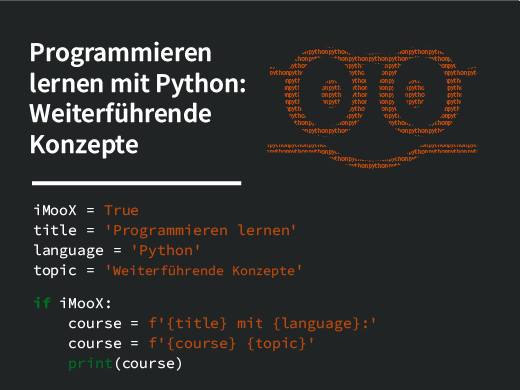

DE
Self-study

Learn Programming with Python: Additional concepts
Graz University of Technology, University College of Teacher Education Styria
Corinna Kindlhofer, Benedikt Neuhold, Josef Wachtler, Gerald Geier
About
Duration
4 units
Unit
2 hours/unit
Licence
CC BY 4.0
Participants
334
Availability
Unlimited
Start Date
9 de abril de 2025
Costs
€ 0.00
Content
Course Content
This MOOC (Massive Open Online Course) covers advanced concepts in Python. Building on the content of the 1st course ‘Learn Programming with Python: Basics’, we will learn further central concepts of the Python programming language step by step. Interactive videos and numerous practical programming examples are used to promote understanding of the content. This course is ideal for beginners with a basic knowledge of Python who want to expand their knowledge.The course is divided into four consecutive lessons: In the first lesson, basic Python programming topics from the first course are repeated for deeper understanding. In the second lesson, we will focus on two data structures that are frequently used in Python programming: lists and dictionaries. In the third lesson, we will look at functions and show you how you can make your code modular and reusable. In the fourth and final lesson, we will look at how to work with files and take a closer look at CSV data.
Course Goals
After completing this course, you will have gained a basic understanding of the concepts presented and are able to apply these concepts directly in practice.At the end of this course, you will be able to...
- use strings and apply their methods and use loops effectively.
- use lists and dictionaries as well as their methods and combine the two data structures.
- create functions, modules and packages.
- read and edit files.
- handle CSV files.
Previous Knowledge
Basic knowledge of Python (variables, conditional statements, loops and data types), ideally completion of the course ‘Learn Programming with Python: Basics’.Certificate
For actively participating in the course you will receive an automatic certificate which includes your name, the course name as well as the completed lessons. We want to point out that this certificate merely confirms that you answered at least 75% of the self-assessment questions correctly.Licence
This work is licensed under CC BY 4.0Course Instructor
Corinna Kindlhofer, Benedikt Neuhold, Josef Wachtler, Gerald Geier
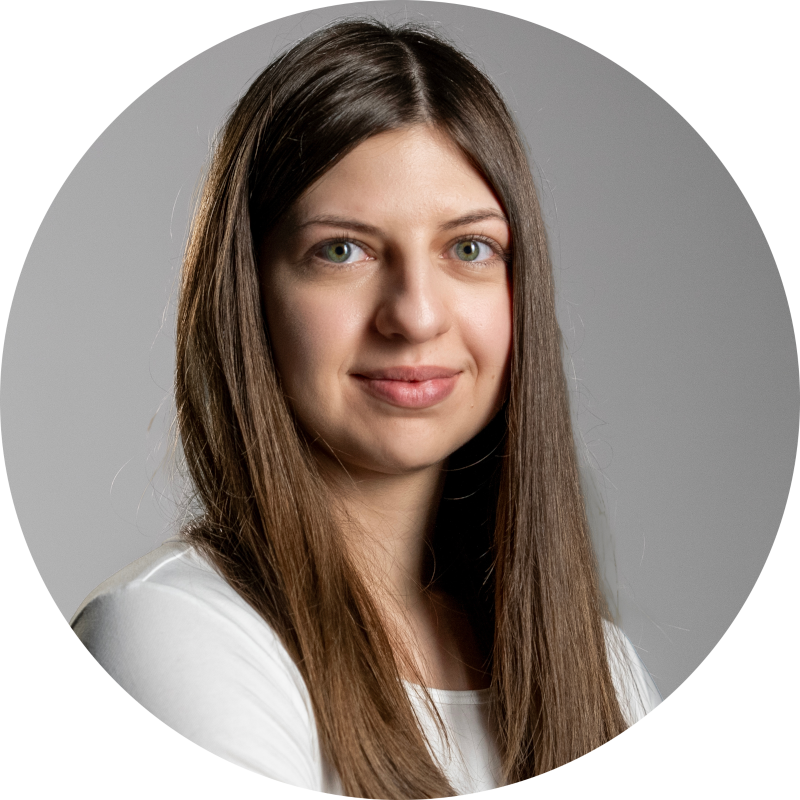 Corinna Kindlhofer BA BSc is currently pursuing a Master's degree in Computer Science at Graz University of Technology. She previously completed a Bachelor's degree in Marketing & Sales and a Bachelor's degree in Computer Science. Alongside her studies, she works for a company in Graz, where she regularly uses Python for various applications.
Corinna Kindlhofer BA BSc is currently pursuing a Master's degree in Computer Science at Graz University of Technology. She previously completed a Bachelor's degree in Marketing & Sales and a Bachelor's degree in Computer Science. Alongside her studies, she works for a company in Graz, where she regularly uses Python for various applications.
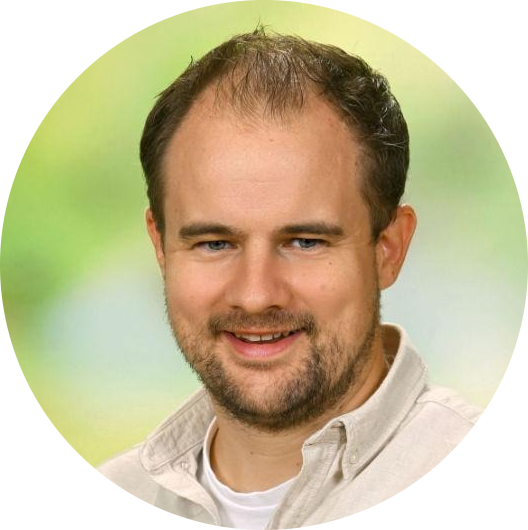
Benedikt Neuhold is a high school teacher at the Gymnasium Hartberg, where he teaches computer science and mathematics. He is passionate about equipping his students with both a solid theoretical foundation and practical skills, ensuring they are well-prepared to navigate the challenges of today’s digital world.
In addition to his role as a high school teacher, Benedikt is a lecturer at the University College of Teacher Education Styria (Pädagogische Hochschule) in Graz. As part of the university’s program “Digitale Grundbildung”, he focuses on training current and future teachers to integrate the latest methods and technologies into their classrooms and to foster innovative teaching practices.
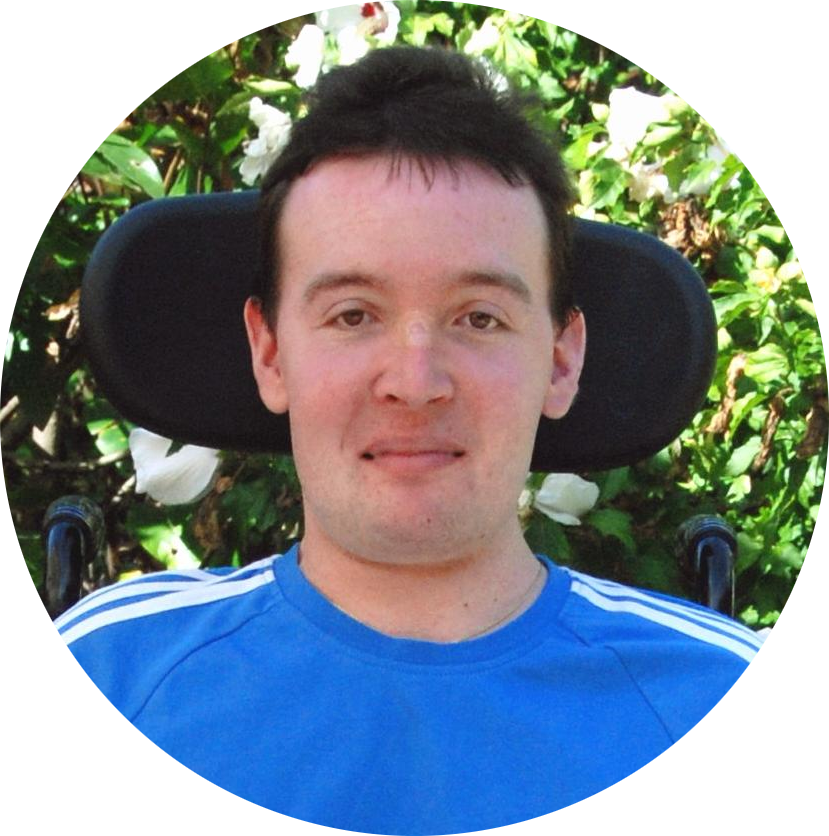
DI Dr. Josef Wachtler BSc is currently working at the Department Educational Technology at Graz University of Technology. His research interests are in the field of video based learning supported by interactive content used in different settings like schools, universities or MOOCs.
He is in charge of the technical aspects of a project where learning apps for children are developed and evaluated. The support of bachelor and master theses is also part of his professional duties.
He has a lot of experience as a software engineer and developer with a focus on developing for the web. He loves Python.
 Mag. Gerald Geier BSc works as a training coordinator in the Department of Computer Science/Digital Education at the Institute for Digital Media Education at the University College of Teacher Education Styria. He is in charge of the university course Digital Basic Education and is jointly responsible for the planning and implementation of the training courses. Additionally, he teaches courses on computer science didactics and focuses on the holistic integration of digital education in schools. Since early 2024, he has been pursuing a doctoral dissertation exploring the use of educational technologies in self-regulated learning in schools, with a particular emphasis on the role of the teacher.
Mag. Gerald Geier BSc works as a training coordinator in the Department of Computer Science/Digital Education at the Institute for Digital Media Education at the University College of Teacher Education Styria. He is in charge of the university course Digital Basic Education and is jointly responsible for the planning and implementation of the training courses. Additionally, he teaches courses on computer science didactics and focuses on the holistic integration of digital education in schools. Since early 2024, he has been pursuing a doctoral dissertation exploring the use of educational technologies in self-regulated learning in schools, with a particular emphasis on the role of the teacher.
His professional activities are rounded off by his work as a teacher of computer science/mathematics at the BG/BRG/BORG Hartberg and as a course leader for digital personnel and organizational development at the Danube University Krems.
Login & Enrol Currently: 334 Participants
Free for all € 0.00
Partners
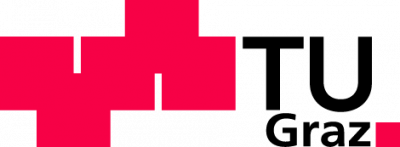
Graz University of Technology
Graz
21855
Participants
75
Courses
Average rating

University College of Teacher Education Styria
Graz
10518
Participants
10
Courses
Average rating